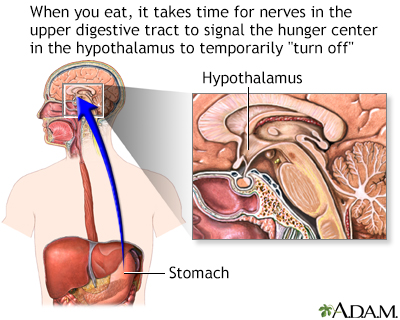| Step 6: Create healthy food habits |
Chances are, you have some food habits that are "good" and some that are "bad" -- to lose weight, you must examine these behaviors and replace the bad habits with healthier ones. Here are some guidelines for developing better food habits.
Always eat regular meals, including breakfast
Skipping meals delivers a double whammy to your weight loss efforts. When you skip meals, your body goes into "starvation mode," signaling your body to conserve as much energy as possible -- this builds up body fat. Skipping meals is also likely to make you very hungry for your next meal, which could cause you to eat more. In fact, eating smaller amounts more frequently -- as often as six times per day -- may be best for losing weight. Bottom line: Eat meals and snacks at about the same time every day.
Eat only in the dining room or at the kitchen table
Don't eat in the bedroom or while watching TV. Confining yourself to the table will help you be more disciplined about eating. Keep food out of sight so you won't be tempted to eat it between meals. Don't "reward" yourself with food or use it for comfort.
Start with small portions
You can always get more later, but your compulsion to "clean your plate" may encourage you to eat more than you should. And don't worry about wasting food, either -- it's better to leave food on your plate than to overeat. Don't automatically reach for seconds or thirds. Finally, keep in mind that if you are used to eating large meals, your stomach will signal hunger until its size reduces, over weeks and months, from eating smaller meals. In other words, it will be tougher to stick to smaller meals at the beginning, but that won't last.
Eat your vegetables first
Then go on to the rest of your meal. This will help you fill your stomach with relatively few calories and lots of fiber. Starting off with a salad is a useful approach. You may be less hungry for the more fattening parts of your meal.
Slow down
It takes time for your body to recognize you have eaten and for the feeling of hunger to go away. Eating too quickly may cause you to eat more food over the same period of time. Savor your food. Not only does it take longer to eat when you fully enjoy each bite, but you may find eating to be more satisfying.

Substitute healthy foods for unhealthy ones
Instead of snacking on potato chips, try carrot sticks, fresh fruit, or yogurt. Sample different kinds of food for variety. Don't put butter or cream sauce on vegetables or a lot of dressing on your salad.
Drink plenty of water
Drink water or another calorie-free drink while eating. This will help you feel full sooner.
Finally, don't forget to take a walk after dinner!
Reviewed By: Jeffrey Heit, MD, Internist with special emphasis on preventive health, fitness and nutrition, Philadelphia VA Medical Center, Philadelphia, PA. Review provided by VeriMed Healthcare Network. Also reviewed by David Zieve, MD, MHA, Medical Director, A.D.A.M., Inc.
© 1997- A.D.A.M., a business unit of Ebix, Inc. Any duplication or distribution of the information contained herein is strictly prohibited.
